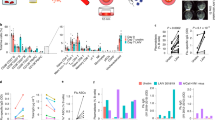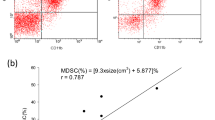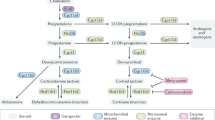Abstract
ALTHOUGH corticosteroids are usually considered to be lympholytic and immunosuppressive, some immunocompetent cells, presumably lymphoid, resist the actions of corticosteroids; for example, the graft versus host cell in chicken1 and mouse2 thymus, and the bone narrow antibody-forming cell precursor3. We have shown4 that the cell(s) in mouse spleen which can initiate graft versus host (GVH) reactions are resistant to the action of hydrocortisone. In these experiments, hydrocortisone was given to normal mice of parental strains. Two days later the surviving spleen cells (about 20%) were transferred to adult F1 hybrid recipients, where they showed unimpaired GVH responses as measured by splenomegaly. In these circumstances, the GVH initiator cell was exposed to hydrocortisone before coming into contact with antigen (mainly H2), and it was thus unlikely to be dividing rapidly, if at all5. Because there is evidence that corticosteroids have their greatest effects on rapidly dividing cells6,7 we have investigated the hydrocortisone sensitivity of GVH cells during antigenic stimulation, when thymus-derived cells are known to proliferate8,9.
This is a preview of subscription content, access via your institution
Access options
Subscribe to this journal
Receive 51 print issues and online access
$199.00 per year
only $3.90 per issue
Buy this article
- Purchase on Springer Link
- Instant access to full article PDF
Prices may be subject to local taxes which are calculated during checkout
Similar content being viewed by others
References
Warner, N. L., Aust. J. Exp. Biol. Med. Sci., 42, 401 (1964).
Blomgren, H., and Andersson, B., Exp. Cell Res., 57, 185 (1969).
Levine, M. A., and Claman, H. N., Science, 167, 1515 (1970).
Cohen, J. J., Fischbach, M., and Claman, H. N., J. Immunol., 105, 1146 (1970).
Syeklocha, D., Siminovitch, L., Till, J. E., and McCulloch, E. A., J. Immunol., 96, 472 (1966).
Miller, J. J., and Cole, L. J., J. Exp. Med., 126, 109 (1967).
Craddock, C. G., Winkelstein, A., Matsuguki, Y., and Lawrence, J. S., J. Exp. Med., 125, 1149 (1967).
Davies, A. J. S., Leuchars, E., Wallis, V., and Koller, P. C., Transplantation, 4, 438 (1966).
Shearer, G. M., and Cudkowicz, G., J. Exp. Med., 130, 1243 (1969).
Elkins, W. L., Transplantation, 9, 273 (1970).
Cerottini, J. C., Nordin, A. A., and Brunner, K. T., Nature, 227, 72 (1970).
Author information
Authors and Affiliations
Rights and permissions
About this article
Cite this article
COHEN, J., CLAMAN, H. Hydrocortisone Resistance of Activated Initiator Cells in Graft versus Host Reactions. Nature 229, 274–275 (1971). https://doi.org/10.1038/229274a0
Received:
Issue Date:
DOI: https://doi.org/10.1038/229274a0
This article is cited by
-
Immunpharmakologie der Kortikosteroide
Klinische Wochenschrift (1982)
Comments
By submitting a comment you agree to abide by our Terms and Community Guidelines. If you find something abusive or that does not comply with our terms or guidelines please flag it as inappropriate.



